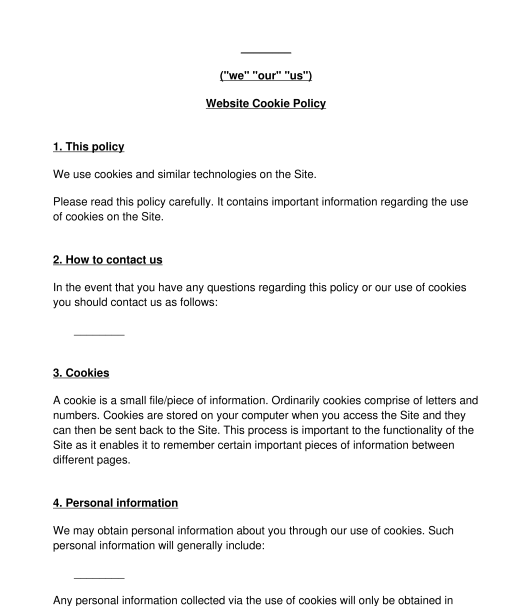 03/11/2025
03/11/2025

Answer a few questions and your document is created automatically.

Your document is ready! You will receive it in Word and PDF formats. You will be able to modify it.

 03/11/2025
03/11/2025
 Word and PDF
Word and PDF
 2 pages
2 pages
A website cookie policy will be held by a website operator in the United Kingdom, to provide website users with key information about the use of cookies on the website.
A website privacy policy will be used by a website operator to provide website users with key information about the collection, use and storage of their personal data (personal information such as their name, IP address and contact details). A privacy policy may refer to the use of cookies as part of the wider policy.
A cookie policy will provide comprehensive, specific information about the use of cookies. A privacy policy will often refer to a cookie policy.
Yes. In order to comply with the relevant legal regulations, a website that uses cookies must hold a cookie policy.
A cookie is a small data file. A cookie is stored on a device and allows online providers to recognise a person as a particular user and allows online providers to store specific details about users. The information collected by cookies might include preferences and login information.
It is not necessary to sign the cookie policy. It can be finalised and placed on the website in an easily accessible location. The website operator must ensure it obtains consent to use cookies, as appropriate.
A website will need to hold other policies and documents, which refer to or may be read alongside the acceptable use policy. This might include:
A cookie policy can remain in place indefinitely. The website operator should ensure the policy is updated if it changes the way in which it uses cookies The website operator should also ensure that the policy is generally updated and reviewed at regular intervals to ensure that the legal content is kept up-to-date. Typically, a policy of this nature will be reviewed at least annually.
A cookie policy should:
The following legal provisions are relevant to the use of cookies on a website:
Further information on cookies can be found on the Information Commissioner's Office website.
You fill out a form. The document is created before your eyes as you respond to the questions.
At the end, you receive it in Word and PDF formats. You can modify it and reuse it.
Website Cookie Policy - Sample, template - Word and PDF
Country: United Kingdom